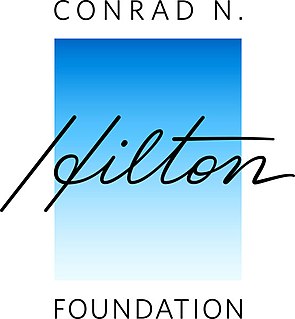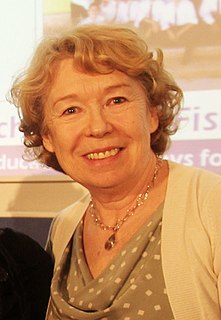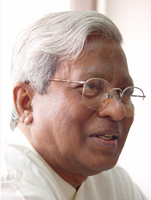Microcredit is the extension of very small loans (microloans) to impoverished borrowers who typically lack collateral, steady employment, or a verifiable credit history. It is designed to support entrepreneurship and alleviate poverty. Many recipients are illiterate, and therefore unable to complete paperwork required to get conventional loans. As of 2009 an estimated 74 million people held microloans that totaled US$38 billion. Grameen Bank reports that repayment success rates are between 95 and 98 percent.
Microfinance is a category of financial services targeted at individuals and small businesses who lack access to conventional banking and related services. Microfinance includes microcredit, the provision of small loans to poor clients; savings and checking accounts; microinsurance; and payment systems. Microfinance services are designed to reach excluded customers, usually poorer population segments, possibly socially marginalized, or geographically more isolated, and to help them become self-sufficient.

The Conrad N. Hilton Foundation is an American non-profit charitable foundation, established in 1944 by hotel entrepreneur Conrad N. Hilton. It remained relatively small until his death on January 3, 1979 when it was named the principal beneficiary of his estate. In 2007, Conrad's son, Barron Hilton announced that he would leave about 97% of his fortune to a charitable remainder unitrust which will eventually be merged with the Foundation.

Dhaka College is a public college located in Dhaka, Bangladesh. It offers higher-secondary education (HSC). It has bachelor's degree and master's degree programs as well which divisions are affiliated to the University of Dhaka.

Ann Lesley Cotton is a Welsh entrepreneur and philanthropist who was awarded an Order of the British Empire (OBE) in the 2006 Queen's New Year Honours List. The honour was in recognition of her services to education of young women in rural Africa as the founder of Camfed.

Akhter Hameed Khan was a Pakistani development practitioner and social scientist. He promoted participatory rural development in Pakistan and other developing countries, and widely advocated community participation in development. His particular contribution was the establishment of a comprehensive project for rural development, the Comilla Model (1959). It earned him the Ramon Magsaysay Award from the Philippines and an honorary Doctorate of law from Michigan State University.
The Orangi Pilot Project collectively designates three Pakistani Non-governmental organisations working together, having emerged from a socially innovative project carried out in 1980s in the squatter areas of Orangi Town, Karachi, Pakistan. It was initiated by Akhtar Hameed Khan, and involved the local residents solving their own sanitation problems. Innovative methods were used to provide adequate low cost sanitation, health, housing and microfinance facilities.

Sir Fazle Hasan Abed, KCMG was the founder and Chair Emeritus of BRAC, one of the world's largest non-governmental organizations.

Aarong is a chain of Bangladeshi department stores specializing in Bengali ethnic wear and handicrafts. It is owned by the non-profit development agency BRAC, and employs thousands of rural artisans across the country. It currently operates fourteen outlets in six Bangladeshi metropolitan cities.
The non-governmental organisation based in Bangladesh which provides microcredit financing.
The Comilla Model was a rural development programme launched in 1959 by the Pakistan Academy for Rural Development. The Academy, which is located on the outskirts of Comilla town, was founded by Akhter Hameed Khan, the cooperative pioneer who was responsible for developing and launching the programme.
1980 (MCMLXXX) was a leap year starting on Tuesday of the Gregorian calendar, the 1980th year of the Common Era (CE) and Anno Domini (AD) designations, the 980th year of the 2nd millennium, the 80th year of the 20th century, and the 1st year of the 1980s decade.

Microcredit for water supply and sanitation is the application of microcredit to provide loans to small enterprises and households in order to increase access to an improved water source and sanitation in developing countries. While most investments in water supply and sanitation infrastructure are financed by the public sector, investment levels have been insufficient to achieve universal access. Commercial credit to public utilities was limited by low tariffs and insufficient cost-recovery. Microcredits are a complementary or alternative approach to allow the poor to gain access to water supply and sanitation.
The Kravis Prize or Henry R. Kravis Prize in Nonprofit Leadership is a philanthropic award for leaders in the nonprofit sector. According to Bloomberg News, the prize "honor[s] those who have demonstrated 'bold leadership' in the nonprofit sector and have shared their best practices with others."
Sandra Mostafa Kabir is a British philanthropist, Executive Director of BRAC UK, Labour Party politician and councillor for Queensbury.
2015 (MMXV) was a common year starting on Thursday of the Gregorian calendar, the 2015th year of the Common Era (CE) and Anno Domini (AD) designations, the 15th year of the 3rd millennium, the 15th year of the 21st century, and the 6th year of the 2010s decade.
Challenging the Frontiers of Poverty Reduction:Targeting the Ultra Poor (CFPR-TUP) project was initiated by BRAC, a Bangladesh-based development organisation in 2002. The ultra poor are a group of people who eat below 80% of their energy requirements despite spending at least 80% of income on food. In Bangladesh, they constitute the poorest 17.5 percent of the population. These people suffer from chronic hunger and malnutrition, have inadequate shelter, are more prone to disease, deprived of education and more vulnerable to recurring natural disasters. The CFPR-TUP programme is aimed at households which are too poor to access the benefits from development interventions such as microfinance and assists them to access mainstream development services. The program costs around US$35 million a year.

BRAC University (BRACU) is a private University in Bangladesh. It was founded as a branch of the BRAC organization by Sir Fazle Hasan Abed in 2001 under the Private University Act.
Najmul Hasan Zahed was a Bangladesh Awami League politician and the former Member of Parliament of Habiganj-2.
Tamara Hasan Abed is a social worker and entrepreneur She is the eldest daughter of Fazle Hasan Abed, Founder Chairperson of BRAC.










